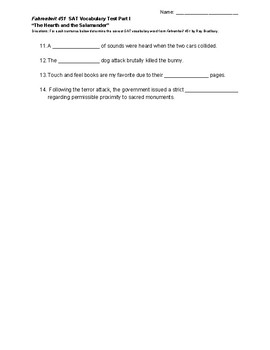
#Fahrenheit 451 wordwall series
It was part of the conference series founded by IDEC1 in 1977, with the name “European Conference on Reading”.

Such practices, the research suggests, will necessitate changes in both teachers’ and students’ identity.Įdited by Margit Böck, Florian Auernig and Andreas Hudelist The 19th European Conference on Literacy in Klagenfurt took place from 13 to 16 July 2015. The research challenges English teachers to consider which pedagogical practices are both appropriate and desirable in the teaching of literacy and which will help students develop the capacity for imagining a wider range of identities across time and space. Data from English-language classrooms in Canada, Pakistan, and Uganda suggest that if learners have a sense of ownership over meaning-making, they will have enhanced identities as learners and participate more actively in literacy practices. In this article, I trace the trajectory of my research on identity, literacy, and English-language teaching informed by theories of investment and imagined communities.

This is in stark contrast to Mildred, who is surrounded by cold, dark imagery.

The appearance of Clarisse early in the novel represents a clear turning point for Montag, who observes the way she reflects his own light back to him. Mildred serves a both as a reflection of his own ignorant state and as a representation of what is broken in his world. Mildred->Montag early->Firemen->Montag middle->Beatty->Clarisse->Faber->Montag lateĪt the beginning of the novel, Montag appears to be ignorant of the world around him and of his own role in that world. Linear array: Ignorance-–>Contemplation->Enlightenment Sample question: In Fahrenheit 451, how does Montag evolve from a state of ignorance into a state of enlightenment? How do the people in Montag’s life reflect or influence his thinking? This sample activity shows how I might use a linear array to teach the words ignorance, contemplation, and enlightenment to high school freshmen. Use linear arrays to represent shades of meaning between words or progression of a story line or character.


 0 kommentar(er)
0 kommentar(er)
